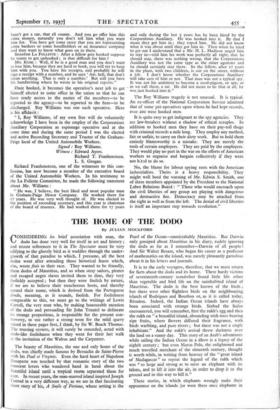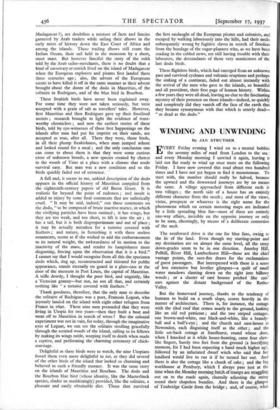THE HOME OF THE DODO
By JULIAN MOCKFORD CONSIDERlNG',-.its brief association with man, the dodo has done very well for itself in art and history ; and recent references to it in The Spectator must be very edifying to the ghostly bird as it waddles through the under- grovirth of that paradise to which, I presume, all the best dodos went after attending those historical feasts which, alas, wrote finis to their race. They wanted to be friendly, these dodos of Mauritius, and so when stray sailors, pirates and escaped negro slaves invited them to dine, they very foolishly accepted ; but then they were foolish by nature, if we are to believe their treacherous hosts, and thereby earned their name, which is derived from the Portuguese doudo, meaning, as it sounds, foolish. For foolishness comparable to this, we must go to the writings of Lewis Carroll, the very man who, by making honourable mention of the dodo and persuading Sir John Tenniel to delineate its strange proportions, is 'responsible for the present con- troversy, to use rather a strong• term for the mild query raised in these pages first, I think, by Sir W. Beach Thomas. The trusting oysters, it will surely be conceded, acted with dodo-like foolishness when they went for their last walk at the invitation of the Walrus and the Carpenter.
The beauty of Mauritius, the one and only home of the dodo, was chiefly made famous by Bemadin de Saint-Pierre with his Paul et Virgink. Even the hard heart of Napoleon Bonaparte was touched by that romantic story of the two innocent lovers who wandered hand in hand about the beautiful island until a tropical storm separated them for ever. In recent years, the man-marred island inspired Joseph Conrad in a very different way, as we see in that 'fascinating short story of his, A Smile of Fortune, whose Setting is the Pearl of the Ocean—unmistakably Mauritius. But Darwin only gossiped about Mauritius in his diary, rudely ignoring the dodo as far as I remember—Darwin of all people ! And Sir Walter Besant, who began his career as a professor of mathematics on the island, was merely pleasantly garrulous about it in his letters and journals.
It is to the early voyagers, therefore, that we must return for facts about the dodo and its home. These hardy victims of seventeenth-century wanderlust found little life other than vegetable and bird life on the uninhabited island of Mauritius. The dodo is the best known of the birds ; but there were other flightless birds on the neighbouring islands of Rodrigues and Bourbon or, as it is called today, Reunion. Indeed, the Indian Ocean islands have always been associated with strange birds. Sinbad the Sailor encountered, you will remember, first the rukh's egg and then the rukh on " a beautiful island, abounding with trees bearing ripe fruits, where flowers diffused their fragrance, with birds warbling, and pure rivers ; but there was not a single inhabitant." And the rukh's arrival threw darkness over the land on a sunny day. This story of an Arab's adventures while sailing the Indian Ocean in a dhow is a legacy of the eighth century ; but even Marco Polo, the enlightened and much travelled merchant of the sixteenth century, thought it worth while, in writing from hearsay of the "great island of Madagascar " to repeat the legend of the rukh which was 4` so large and strong as to seize an elephant with its talons, and to lift it into the air, in order to drop it to the ground and in this way to kill it."
These stories, in which elephants wrongly make their appearance on the islands (or were there once elephants in Madagascar ?), are doubtless a mixture of facts and fancies garnered by Arab traders while sailing their dhows in the early mists of history down the East Coast of Africa and among the islands. Those trading dhows still roam the Indian Ocean, their sail held in the monsoon by a short, stout mast. But however fanciful the story of the rukh told by the Arab sailor-merchants, there is no doubt that a kind of cassowary or ostrich lived on the island of Madagascar when the European explorers and pirates first landed there three centuries ago ; alas, the advent of the Europeans seems to have killed it off in the same manner as their advent brought about the doom of the dodo in Mauritius, of the solitaire in Rodrigues, and of the blue bird in Bourbon.
These freakish birds have never been explained away. For some time they were not taken seriously, but were accepted with a grain of salt as travellers' tales. However, first Mauritius and then Rodrigues gave up their fossilised secrets ; research brought to light the evidence of trust- worthy chroniclers ; and now the earliest stories of these birds, told by eye-witnesses of those first happenings on the islands after man had put his imprint on their sands, are accepted as true, after all. There they were, those birds, in all their plump freakishness, when man jumped ashore and looked round for a meal ; and the only conclusion one can come to about them is that they were some curious cross of unknown breeds, a new species created by chance in the womb of Time at a place with a climate that made survival easy. But man was a new condition and so the birds quickly faded out of existence.
A full and, it seems to me, unkind description of the dodo appears in the official history of Mauritius compiled from the eighteenth-century papers of old Baron Grant. It is realistic far beyond the point of rudeness ; and insult is added to injury by some final comments that are sadistically cruel. " It may be said, indeed," run these comments on the dodo, " to be composed of brute inactive matter, in which the vivifying particles have been omitted ; it has wings, but they are too weak, and too short, to lift it into the air ; it has a tail, but it is both disproportionate and out of place ; it may be actually mistaken for a tortoise covered with feathers ; and nature, in furnishing it with these useless ornaments, seems as if she wished to add the embarrassment to its natural weight, the awkwardness of its motion to the inactivity of the mass, and render its lumpishness more disgusting, forcing upon the observation that it is a bird." I cannot say that I would recognise from all this the specimen dodo which, dug up, reconstructed and titivated for public appearance, stands eternally on guard in a glass-case at the door of the museum in Port Louis, the capital of Mauritius. A trifle dowdy, I thought the poor bird, and ungainly, like a Victorian granny—but not, no not all that, and certainly nothing like " a tortoise covered with feathers."
Thank goodness, therefore, that the only man to describe the solitaire of Rodrigues was a poet, Francois Leguat, who joyously landed on the island with eight other refugees from France in 1690. These nine men pretended that they were living in Utopia for two years—then they built a boat and went off to Mauritius in search of wives ! But the colonial experiment was not in vain, for today, through the imaginative eyes of Leguat, we can see the solitaire strolling gracefully through the scented woods of the island, railing to its fellows by making its wings rattle, weeping itself to death when made a captive, and performing the charming ceremony of chick- marriage.
Delightful as these birds were to watch, the nine Utopians found them even more delightful to eat, as they did several of the other birds of the island that looked so charming and behaved in such a friendly manner. It was the same story on the islands of Mauritius and Bourbon. The dodo and the Bourbon blue bird (whose identity, like the Maeterlinck species, eludes us maddeningly) provided, like the solitaire, a pleasant and easily obtainable diet. Those that survived the first onslaught of the European pirates and colonists, and escaped by walking laboriously into the hills, had their necks subsequently wrung by fugitive slaves in search of freedom from the bondage of the sugar-planters who, as we have been reading in the cabled news, are still having trouble with their labourers, the descendants of those very masticators of the last dodo birds.
These flightless birds, which had emerged from an unknown past and survived cyclones and volcanic eruptions and perhaps the sinking of a continent, faded out almost instantly with the arrival of the men who gave to the islands, so beautiful and all provident, their first page of human history. Within a few years they were all dead, leaving no clue to the fascinating mystery of their presence on those islands—indeed, so quickly and completely did they vanish off the face of the earth that they became synonymous with that which is utterly dead- " as dead as the dodo."











































 Previous page
Previous page